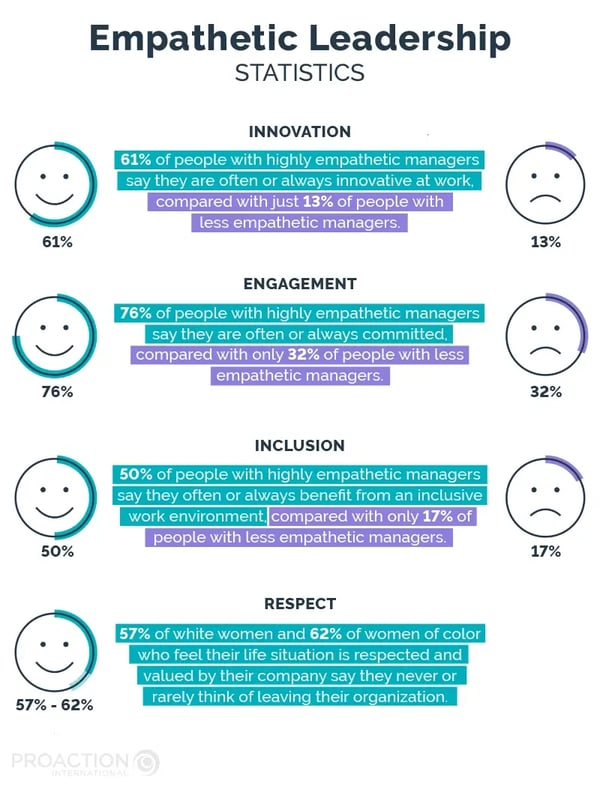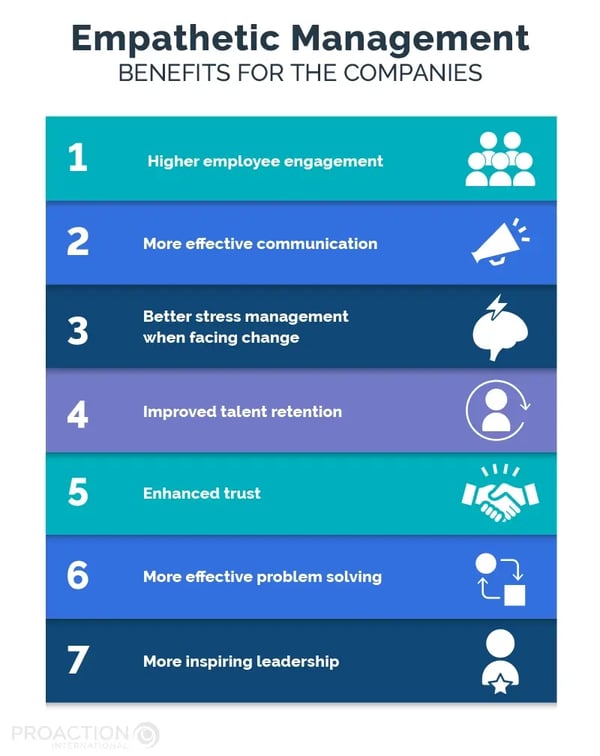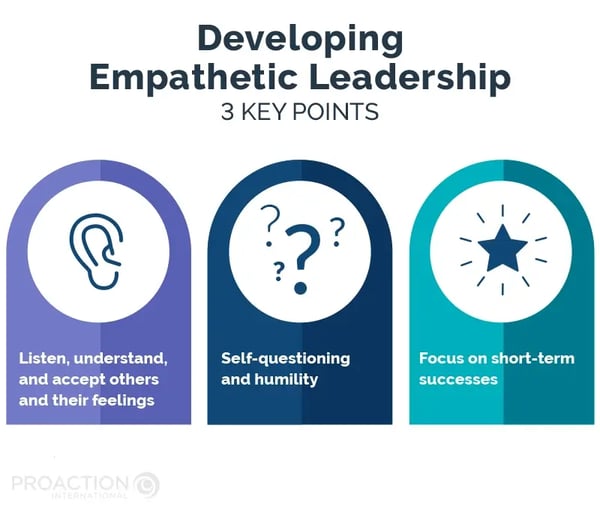What is an empathetic leadership style?
Empathy refers to someone's ability to put themselves in someone else's shoes and to perceive what emotion the other person may be holding. By empathizing with this other person's feelings, you can understand them better and adapt your behavior and language accordingly.
Opinions differ as to whether empathy is innate. However, we know that empathy is more or less pronounced in certain individuals, depending on their upbringing and life experiences. In general, empathy is more pronounced when it comes to someone we know and like, or someone going through the same thing as us.
If we return to our empathetic leaders, they will use this skill to integrate better and understand team members' needs, thus facilitating interactions with them.
How empathy contributes to Organizations' greater success
According to a study carried out by the global non-profit organization Catalyst on nearly 900 employees worldwide:
- 61% of people with highly empathetic superiors say they are innovative at work, compared with only 13% of people with less empathetic leaders.
- 76% of people with highly empathetic managers report being committed, compared with only 32% of people with less empathetic managers.
- 50% of people with highly empathetic managers report an inclusive work environment, compared with only 17% of people with less empathetic managers.
- 57% of white women and 62% of women of color who feel their life situation is respected and valued by their company say they never or rarely think of leaving their organization.

Empathy matters. It has become a critical leadership skill in the workplace. A fact amply proven by numerous research studies. But it goes even further. Having an empathetic leader has a positive impact on every part of the organization: its employees, its performance, and the image it conveys.
Let's look at how this critical skill is a real asset to a company and how this leadership competency helps create positive relationships and a much better work environment.
More committed employees
In a company, empathetic leadership will help foster a greater sense of belonging among employees and boost their commitment, as they feel listened to, recognized, and respected.
Empathy appeals to the emotional and thus is a powerful motivation source. The results? Increased productivity, more involved, diligent, and creative workers who are less afraid to suggest new things and innovate.
More effective communication
An empathetic leader can understand and connect emotionally with every team member. This ability fosters open, honest, and transparent communication, enabling employees to feel heard and understood. It also leads to better human interactions and strong relationships within the company.
Better stress management in the face of change
Fears, uncertainties, leaving one's comfort zone: in times of change, people's stress levels tend to rise. The pandemic has demonstrated this, but it's not the only one. We live in an ever-changing world where every day brings its share of upheavals (economic, ecological, social, AI, Etc.). In such a context, a leader demonstrating empathy helps employees to stay on course and in high spirits, to feel accompanied and even protected in the face of the potential dangers they relate to change.
Better talent retention
Empathy in the workplace helps retain the best talent within the company. Employees appreciate working with someone who sees them as people, not just as resources for achieving objectives.
Empathy shows that the leader cares about workers' well-being and professional development, encouraging them to stay with the company.
Increased trust
Employees tend to feel more confident when they have an empathetic leader. Recognizing and validating their team members' emotions and experiences provides a safe and supportive working environment. Employees are more inclined to share their ideas, concerns, and problems, knowing they will be respected and understood.
More effective problem-solving
Empathy enables leaders to understand better the challenges faced by their team members. Many managers can offer support and appropriate solutions by putting themselves in other people's shoes. This helps solve problems and facilitates decision-making.
More inspiring leadership
An empathetic leader is often seen as a role model. Their compassion, genuine care, good understanding, and benevolence inspire team members to behave similarly. That, in turn, fosters cohesion between different employees while encouraging mutual support, cooperation, and respect.

Three ways to practice empathetic leadership
As mentioned above, empathy is a soft skill that can be developed with practice, like training a muscle. Here are three essentials for enhancing this faculty and implementing empathetic leadership in the workplace:
1) Listen, understand, and accept others and their feelings
First, it's vital to cultivate emotional intelligence by being attentive to your emotions and their impact on others. You have to practice active listening to show genuine interest. Paying attention to your colleagues' reactions is also essential, as being open to their opinions may differ from yours.
Putting yourself in other people's shoes and trying to understand their experiences and challenges is also important. That requires the patience and openness to recognize that each individual has unique, legitimate needs and feelings.
Developing empathetic communication skills, such as validating emotions and expressing gratitude, can also help strengthen empathy within leadership.
Finally, it is essential to maintain a trusting, supportive, and positive work environment where employees have psychological safety and can freely express their views.
2) Self-questioning and humility
As the saying goes: "The error is human." As a leader, you are a role model, but that doesn't mean you don't have the right to make mistakes. It's important to know this, admit it when it's the case, and take responsibility. Assume you only sometimes have the answer and can make mistakes or express yourself poorly.
A leader capable of questioning himself is a human leader who shows humility, learns from his mistakes, and makes his employees want to trust and follow him.
3) Focus on short-term successes
To foster motivation and confidence among your employees, you need to take a different approach to planning and communication. Rather than focusing solely on mistakes and difficulties when following an action plan, try instead to highlight short-term successes.
Instead of discussing only what didn't work, value the small goals achieved throughout the process.
This approach balances moments of readjustment with moments of recognition. Workers feel encouraged, valued, and confident. They are more willing to improve on certain points and remain motivated.

The importance of Leaders' empathy in Team management
By taking the time to recognize the emotions and experiences of your team members, listening to them attentively, encouraging them, and managing any conflicts constructively, you build a working environment where employees feel understood, respected, and supported.
Empathetic management creates a genuine relationship between the manager and their team, whose members feel free to express themselves and share their ideas, concerns, and aspirations. This invaluable bond contributes to closer collaboration, greater job satisfaction, and better employee performance.
Empathetic leadership: a considerable asset for today's companies
Empathy has a direct impact on team productivity. By actively listening to employees, recognizing and valuing their feelings, and focusing on the positive rather than the negative, the empathetic leader creates a space conducive to success. Increased productivity, better talent retention, stronger interpersonal relationships, and better stress management in times of crisis or change: the positive outcomes of this approach are manifold.
At a time when the human condition and employee well-being have become a priority, empathetic leadership skills are proving to be an essential lever for promoting a more humane, positive, and sustainable company culture. By nurturing this ability, managers can transform their organization into a place where employee satisfaction and performance coexist harmoniously.









